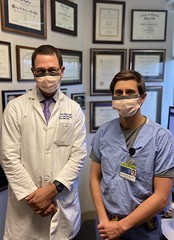Post written by Juan E. Corral, MD, and Michael B. Wallace, MD, MPH, from the Division of Gastroenterology and Hepatology, Mayo Clinic, Jacksonville, Florida, USA.

In the first months of the 2019 novel coronavirus (COVID-19) pandemic, hospitals and endoscopy centers across the world had to stop performing endoscopies leading to significant health and economic losses.
The PCR test for COVID-19 (nasal swab) became available at our institution in March 2020. This offered an opportunity to test our patients prior to endoscopy, getting results within a few hours, at a cost between 75 USD and 125 USD. However, there were no guidelines explaining how to implement the test to reopen our endoscopy workflow. We used a computer model to compare different strategies to start using the test and measure the health and economic results of each strategy.
We found that PCR testing for COVID-19 within 48 hours prior to endoscopy was a safe and effective intervention to resume procedures in semi-urgent and elective indications.
In our institution, investing 22 USD and 105 USD in testing per patient allowed completion of 19.4% and 95.3% of baseline endoscopies, respectively. False negative results are particularly important as they represent higher risk to our endoscopy teams. Fortunately, we estimated that false negatives were only seen after testing 4,700 patients.
At a national level, using a similar test-and-scope strategy would require 13 and 64 million USD per week, with a return of 165 and 767 million USD to providers, leaving 65 and 325 health care workers infected (testing semi-urgent cases only vs testing all patients, respectively).
We present our results as one important piece of the 4-phase roadmap to resume clinical services in the COVID-19 pandemic. PCR screening should be implemented during the second phase of the pandemic, once the healthcare system is able to test and isolate all suspected COVID-19 cases.
Read the full article online.
The information presented in Endoscopedia reflects the opinions of the authors and does not represent the position of the American Society for Gastrointestinal Endoscopy (ASGE). ASGE expressly disclaims any warranties or guarantees, expressed or implied, and is not liable for damages of any kind in connection with the material, information, or procedures set forth.
